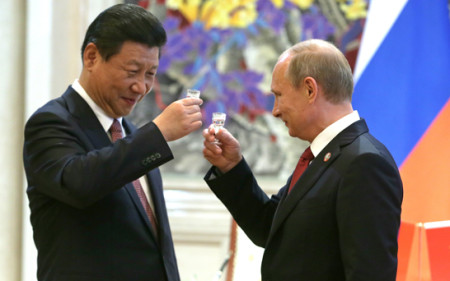– De-Dollarization Du Jour: Russia’s Largest Bank Issues Yuan-Denominated Guarantees (ZeroHedge, June 7, 2015):
The unipolar, dollar-dominated post-war world is shifting under Washington’s feet.
Leading the push towards multipolarity and de-dollarization are a resurgent Russia and China, the rising superpower. The demise of the Bretton Woods world order is perhaps nowhere more apparent than in the launch of the BRICS bank and the establishment of the AIIB. These new structures represent a move away from US-dominated multilateral institutions and their very existence suggests that a failure to adapt to economic realities and an inability or unwillingness to meet the needs of the modern world may soon drive institutions like the IMF into irrelevancy.
If the demise of the existing supranational economic order seems improbable, or if calls for its downfall appear at the very least to be premature, consider recent events.
While the US obstructs efforts to reform the IMF and give member countries representation that’s commensurate with their economic clout, and as the Fund itself bickers with the EU over aid to Greece, the BRICS bank (which hasn’t even officially launched) has offered Greece a spot at the table with some reports suggesting Athens may be able to contribute its paid in capital in installments while receiving aid in the interim.
China has pledged to invest some $50 billion in Pakistani infrastructure via Beijing’s Silk Road initiative and the AIIB. The money will fund power plants, roads, railways, and, perhaps most importantly, the Iran-Pakistan natural gas pipeline. The vast sum represents 53% more than the US has given Islamabad over the past 13 years combined. China is also set to invest an equally large sum in Brazil and is even considering the construction a railroad over the Andes, which would connect Brazil to China via the Pacific and ports in Peru. Meanwhile, lawmakers in Washington fight over whether infrastructure spending could have prevented an Amtrak derailment.
When considering the above, it’s important to understand that the BRICS bank isn’t simply a channel by which rising EM powers can ban together to project their growing influence in the face of the multilateral institutions which they feel have left them underrepresented. Similarly, the AIIB is more than a foreign policy tool that will allow Beijing to establish regional dominance.
Both institutions will serve to accelerate de-dollarization. Russia, for instance, has proposed the establishment of a BRICS alternative to SWIFT. China, meanwhile, is set to ensure that the yuan plays an outsized role in lending through the AIIB.
In yet another sign that Russia and China are set to work together to extricate themselves from a dependence on the dollar specifically and on Western financial institutions more generally, Russia’s largest bank has, for the first time, extended yuan-denominated letters of credit in concert with the Chinese Export-Import bank.
More, via Sberbank:
Sberbank issued its maiden letters of credit with financing from The Export-Import Bank of China for Baikal Bank’s client JSC Pharmasyntez.
JSC Pharmasyntez approached Sberbank about the possibility to finance letters of credit in yuan (CNY) for the import contract to supply pharmaceutical products worth more than 29 mln yuan.
The first LCs with financing from The Export-Import Bank of China have allowed the client to meet its current working capital needs while continuing to actively cooperate with Chinese suppliers.
The development of cooperation with The Export-Import Bank of China expands Sberbank’s possibilities to finance clients’ foreign trade with Chinese counterparties.
* * *
Recall that last October, Russia and China opened a $25 billion currency swap line, an effort which not only serves to bolster ties between Moscow and Beijing in terms of investment and trade, but which also helps to secure Russia against the financial strain imposed by Western sanctions.
